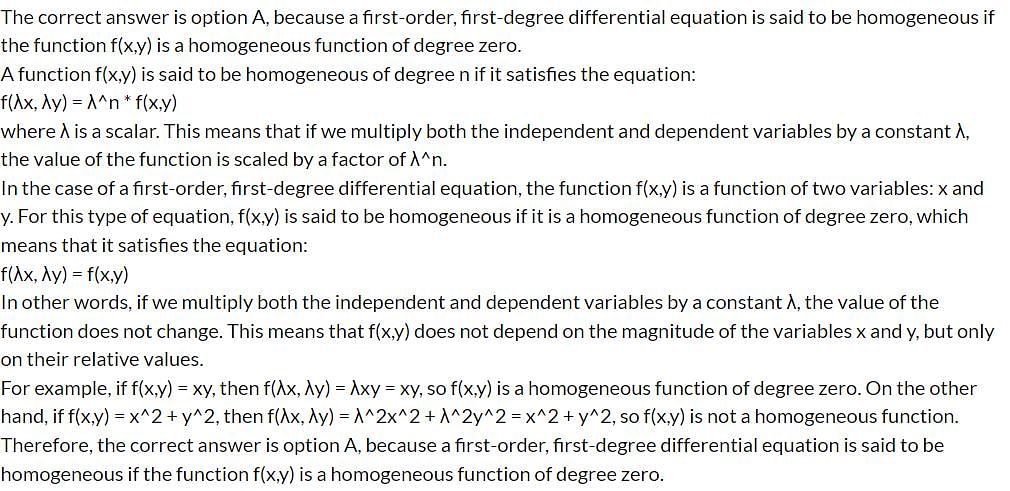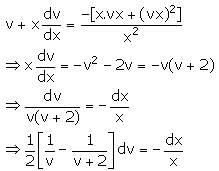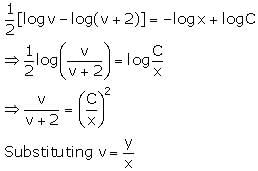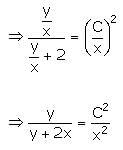JEE Exam > JEE Tests > Mathematics (Maths) Class 12 > Test: Homogeneous Differential Equations - JEE MCQ
Test: Homogeneous Differential Equations - JEE MCQ
Test Description
10 Questions MCQ Test Mathematics (Maths) Class 12 - Test: Homogeneous Differential Equations
Test: Homogeneous Differential Equations for JEE 2024 is part of Mathematics (Maths) Class 12 preparation. The Test: Homogeneous Differential Equations questions and answers have been
prepared according to the JEE exam syllabus.The Test: Homogeneous Differential Equations MCQs are made for JEE 2024 Exam. Find important
definitions, questions, notes, meanings, examples, exercises, MCQs and online tests for Test: Homogeneous Differential Equations below.
Solutions of Test: Homogeneous Differential Equations questions in English are available as part of our Mathematics (Maths) Class 12 for JEE & Test: Homogeneous Differential Equations solutions in
Hindi for Mathematics (Maths) Class 12 course. Download more important topics, notes, lectures and mock
test series for JEE Exam by signing up for free. Attempt Test: Homogeneous Differential Equations | 10 questions in 10 minutes | Mock test for JEE preparation | Free important questions MCQ to study Mathematics (Maths) Class 12 for JEE Exam | Download free PDF with solutions
Test: Homogeneous Differential Equations - Question 1
The solution of the differential equation  is :
is :
Detailed Solution for Test: Homogeneous Differential Equations - Question 1
Test: Homogeneous Differential Equations - Question 2
The solution of the differential equation is :
is :
Detailed Solution for Test: Homogeneous Differential Equations - Question 2
| 1 Crore+ students have signed up on EduRev. Have you? Download the App |
Test: Homogeneous Differential Equations - Question 3
The first order, first degree differential equation y’ = f(x,y) is said to be homogeneous, if
Detailed Solution for Test: Homogeneous Differential Equations - Question 3
Test: Homogeneous Differential Equations - Question 4
The solution of the differential equation  is S:
is S:
Detailed Solution for Test: Homogeneous Differential Equations - Question 4
Test: Homogeneous Differential Equations - Question 5
The solution of the differential equation is :
Detailed Solution for Test: Homogeneous Differential Equations - Question 5
Test: Homogeneous Differential Equations - Question 6
The solution of the differential equationis :
Detailed Solution for Test: Homogeneous Differential Equations - Question 6
Test: Homogeneous Differential Equations - Question 7
The solution of the differential equation is :
Detailed Solution for Test: Homogeneous Differential Equations - Question 7
Test: Homogeneous Differential Equations - Question 8
Find the differential equation of all the straight lines touching the circle x2 + y2 = r2.
Detailed Solution for Test: Homogeneous Differential Equations - Question 8
Test: Homogeneous Differential Equations - Question 9
The solution of differential equation x2dy + y(x + y)dx = 0 when x = 1, y = 1 is:
Detailed Solution for Test: Homogeneous Differential Equations - Question 9
Test: Homogeneous Differential Equations - Question 10
The solution of the differential equation is :
Detailed Solution for Test: Homogeneous Differential Equations - Question 10
|
204 videos|290 docs|139 tests
|
Information about Test: Homogeneous Differential Equations Page
In this test you can find the Exam questions for Test: Homogeneous Differential Equations solved & explained in the simplest way possible.
Besides giving Questions and answers for Test: Homogeneous Differential Equations, EduRev gives you an ample number of Online tests for practice
|
204 videos|290 docs|139 tests
|
Download as PDF



 .......(i)
.......(i)



 ......(ii)
......(ii)
















